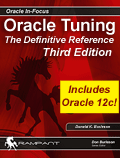|
 |
|
Oracle Outer Join Tips
Oracle Database Tips by Donald Burleson |
An Oracle SQL outer join differs from a natural
join because it includes non-matching rows. Oracle SQL has
several joins syntax variations for outer joins.
Outer join (+) syntax
examples
The most common notation for an outer join is
the (+) notation. This, from the great book "Easy
Oracle SQL" by Lt. Col. John Garmany:
For example, if I list my authors and the books
they have written, I get the results below.
SQL> select
2 author_last_name,
3 book_key
4 from
5 author join book_author
using (author_key)
6 order by author_last_name;
AUTHOR_LAST_NAME
BOOK_K
---------------------------------------- ------
hester
B101
hester
B109
hester
B116
jeckle
B102
. . .
The problem with this listing is that there are
ten authors in the author table and only eight listed. The
remaining two authors have not yet written a book. What if I wanted
the listing to include these two authors? Because they do not match
the equal join, I will need to use an outer join. An outer join
will include all rows from the outer table and those matching rows
from the other table. Rows that are included from the outer table
that have no match in the other table will have NULLs in those
columns.
SQL> select
2 author_last_name,
3 book_key
4 from
5 author left outer join
book_author using (author_key)
6 order by author_last_name;
In the example above, the AUTHOR table is on the
left, and we are using a left outer join, so we get all the rows in
the AUTHOR table and the matching rows in the
book_author table. Notice
that both authors clark and mee now are listed, and the
book_key column is NULL.
In the standard Oracle format, outer joins can be confusing. Below
is the same query in the standard Oracle format.
select
author_last_name,
book_key
from
author,
book_author
where
author.author_key =
book_author.author_key(+)
order by author_last_name;
Notice the (+) in the WHERE clause. This
indicates a left outer join. If we were using a right outer join,
the WHERE clause would be:
author.author_key(+) = book_author.author_key
Here, all the rows from the
book_author table would be
included and the missing rows from the AUTHOR table would be NULL.
The example below demonstrates the ANSI right outer join.
SQL> select
2 author_last_name,
3 book_key
4 from
5 author right outer join
book_author using (author_key)
6 order by author_last_name;
AUTHOR_LAST_NAME
BOOK_K
---------------------------------------- ------
hester
B116
hester
B109
hester
B101
 |
If you like Oracle tuning, you may enjoy my new book "Oracle
Tuning: The Definitive Reference", over 900 pages
of BC's favorite tuning tips & scripts.
You can buy it direct from the publisher for 30%-off and get
instant access to the code depot of Oracle tuning scripts. |
|
